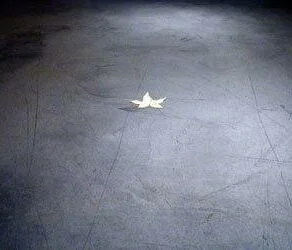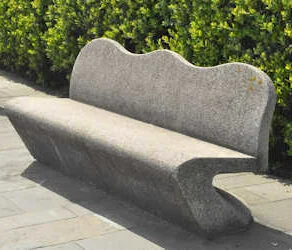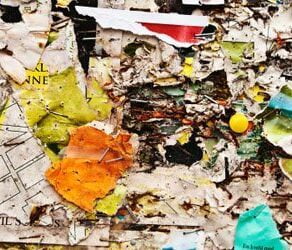Mary Lou asked: How do I clean calcium build up from concrete blocks in the basement? We had water in the basement, and there is a lot of calcium build up on the cement blocks.
When calcium deposits land on the surface of your concrete, there is a brief amount of time that they can be removed with scrubbing and water. However, once they harden, they will require the use of acid to remove. The strength of the acid will depend largely on the thickness of the deposits and the amount of time they have been present. Start with the weakest acid and work your way up to the harsher acids until the deposits are removed.
You Will Need:
- Vinegar
- Acetic acid
- Hydrochloric acid
- Soft cloths
- Water
- Scrub brush
- Spray bottle
Steps to Remove the Deposits:
- Vinegar is a weaker acid, but effective in removing most calcium deposits.
- Moisten a cloth well with the vinegar.
- Blot the vinegar onto the deposits so they are thoroughly moistened. The vinegar can also be put in a spray bottle and sprayed onto the surface.
- Allow the vinegar to soak on the surface for a few minutes.
- Scrub with a stiff brush. If you see the calcium deposits breaking up and coming loose, you know the vinegar is working. Continue, reapplying the vinegar as needed, until the deposits are removed.
- If the vinegar is not working, it’s time to kick it up a notch. The next level of acid is acetic acid. This is the same type of acid found in vinegar, but is available in much higher strengths at hardware stores.
- Using protective gloves and eyewear, apply the acid to the surface as before.
- Allow it to soak and then scrub the surface.
- Reapply as long as the deposits are being removed.
- If the acetic acid does not remove the deposits, as is possible with very old deposits, a strong acid will be required. Hydrochloric acid will remove the deposits, and requires safety precautions to avoid harm to skin. Wear protective eyewear and gloves.
- Carefully apply the acid to the deposits.
- Scrub with a scrub brush.
- Once the deposits are removed, rinse the surface well to remove all of the acid.
- If desired, the acid can be neutralized with baking soda or other base.
- Rinse well with water.
- Allow the surface to dry.
Additional Tips and Advice
- To avoid tough build up in the future, clean the area regularly before the deposits have a chance to harden and thicken.
- Dispose of all acids properly to avoid damage to drainage systems.
- Follow all safety precautions on the packages of acids.










If the cement block is outside and the acid is used to clean the wall, will it damage the soil/plants nearby? Thank you for the information you provided.
I have the same question as Pat does from October 9th, 2013.
I didn’t see an answer yet.
I don’t believe the vinegar wash will hurt soil/plants as long as it’s not too much used. But what about the other acids? Thanks for any help you can give!!
Dora,
It is definitely possible that the vinegar or any of the stronger acids could harm your plants. However, it would depend on how much acid you are using, as it will be diluting while it is rinsed, as well as what types of plants are nearby.
To prevent any possible plant damage, soak the nearby plants and grass a half-hour before applying or rinsing off any acid; that way the plants will get their fill of water and hopefully not try to drink any of the acid runoff. Rinse the plants afterward as well to dilute the acid as much as possible. Another idea is to put a tarp over any plants/soil; I’d suggest a plastic painter’s drop cloth (less than $2 at Walmart) and duct tape. Another idea is to sprinkle the painter’s tarp with baking soda so that the acid is neutralized before it runs off the edges of the tarp.
You can also research the plants you are most concerned about to determine what their soil pH requirements are. For example, rhododendrons prefer a slightly more acidic soil and could suffer if you directly sprinkle their area with baking soda that does not get neutralized by the acid and remains left over, making their soil pH more alkaline. According to Lawnsmith, grasses also prefer a slightly acidic soil (pH 5.5-7.0), whereas weeds prefer a more alkaline soil. So there are plants that could actually benefit from the acid runoff on their soil, whereas others, such as lilacs or some weeds, would not. You can pick up a soil pH meter or kit from your local hardware store to determine the starting pH of your soil and look for any changes after rinsing the acids.
If any of the acids are splashed directly onto the leaves and do not get rinsed, I would imagine that it would leave a mark. However, I just conducted a test – poured a drop of vinegar onto the leaves of a philodendron and an azalea – and in 10 minutes there has been no effect. You can conduct the same test with your plants and the stronger acids to determine what action should be taken to protect those plants if needed.
Source: A Garden for the House – Got Weeds? Use Vinegar, Not Roundup
Source: Horticulture – Plants for Alkaline Soil
Source: Lawnsmith – Lawn Soil Acidity, Alkalinity and pH
I have white calcium buildup inside the garage walls. Can’t I just use a bleach mixture in my power washer and basically do the same thing, or is the brushing and dabbing necessary?
Are there people or companies that get rid of calcium build up?
Russ,
A driveway cleaning company should be able to remove it. You can also contact paver restoration companies in your area.